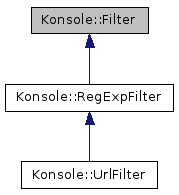Konsole
#include <Filter.h>

Classes | |
| class | HotSpot |
Public Member Functions | |
| Filter () | |
| virtual | ~Filter () |
| HotSpot * | hotSpotAt (int line, int column) const |
| QList< HotSpot * > | hotSpots () const |
| QList< HotSpot * > | hotSpotsAtLine (int line) const |
| virtual void | process ()=0 |
| void | reset () |
| void | setBuffer (const QString *buffer, const QList< int > *linePositions) |
Protected Member Functions | |
| void | addHotSpot (HotSpot *) |
| const QString * | buffer () |
| void | getLineColumn (int position, int &startLine, int &startColumn) |
Detailed Description
A filter processes blocks of text looking for certain patterns (such as URLs or keywords from a list) and marks the areas which match the filter's patterns as 'hotspots'.
Each hotspot has a type identifier associated with it ( such as a link or a highlighted section ), and an action. When the user performs some activity such as a mouse-click in a hotspot area ( the exact action will depend on what is displaying the block of text which the filter is processing ), the hotspot's activate() method should be called. Depending on the type of hotspot this will trigger a suitable response.
For example, if a hotspot represents a URL then a suitable action would be opening that URL in a web browser. Hotspots may have more than one action, in which case the list of actions can be obtained using the actions() method.
Different subclasses of filter will return different types of hotspot. Subclasses must reimplement the process() method to examine a block of text and identify sections of interest. When processing the text they should create instances of Filter::HotSpot subclasses for sections of interest and add them to the filter's list of hotspots using addHotSpot()
Constructor & Destructor Documentation
| Filter::Filter | ( | ) |
Constructs a new filter.
Definition at line 164 of file Filter.cpp.
|
virtual |
Definition at line 170 of file Filter.cpp.
Member Function Documentation
|
protected |
Adds a new hotspot to the list.
Definition at line 223 of file Filter.cpp.
|
protected |
Returns the internal buffer.
Definition at line 216 of file Filter.cpp.
|
protected |
Converts a character position within buffer() to a line and column.
Definition at line 189 of file Filter.cpp.
| Filter::HotSpot * Filter::hotSpotAt | ( | int | line, |
| int | column | ||
| ) | const |
Adds a new line of text to the filter and increments the line count.
Returns the hotspot which covers the given line and column, or 0 if no hotspot covers that area
Definition at line 240 of file Filter.cpp.
| QList< Filter::HotSpot * > Filter::hotSpots | ( | ) | const |
Returns the list of hotspots identified by the filter.
Definition at line 231 of file Filter.cpp.
| QList< Filter::HotSpot * > Filter::hotSpotsAtLine | ( | int | line | ) | const |
Returns the list of hotspots identified by the filter which occur on a given line.
Definition at line 235 of file Filter.cpp.
|
pure virtual |
Causes the filter to process the block of text currently in its internal buffer.
Implemented in Konsole::RegExpFilter.
| void Filter::reset | ( | ) |
Empties the filters internal buffer and resets the line count back to 0.
All hotspots are deleted.
Definition at line 177 of file Filter.cpp.
| void Filter::setBuffer | ( | const QString * | buffer, |
| const QList< int > * | linePositions | ||
| ) |
TODO: Document me.
Definition at line 183 of file Filter.cpp.
The documentation for this class was generated from the following files:
Documentation copyright © 1996-2014 The KDE developers.
Generated on Tue Oct 14 2014 22:31:24 by doxygen 1.8.7 written by Dimitri van Heesch, © 1997-2006
KDE's Doxygen guidelines are available online.
 KDE API Reference
KDE API Reference